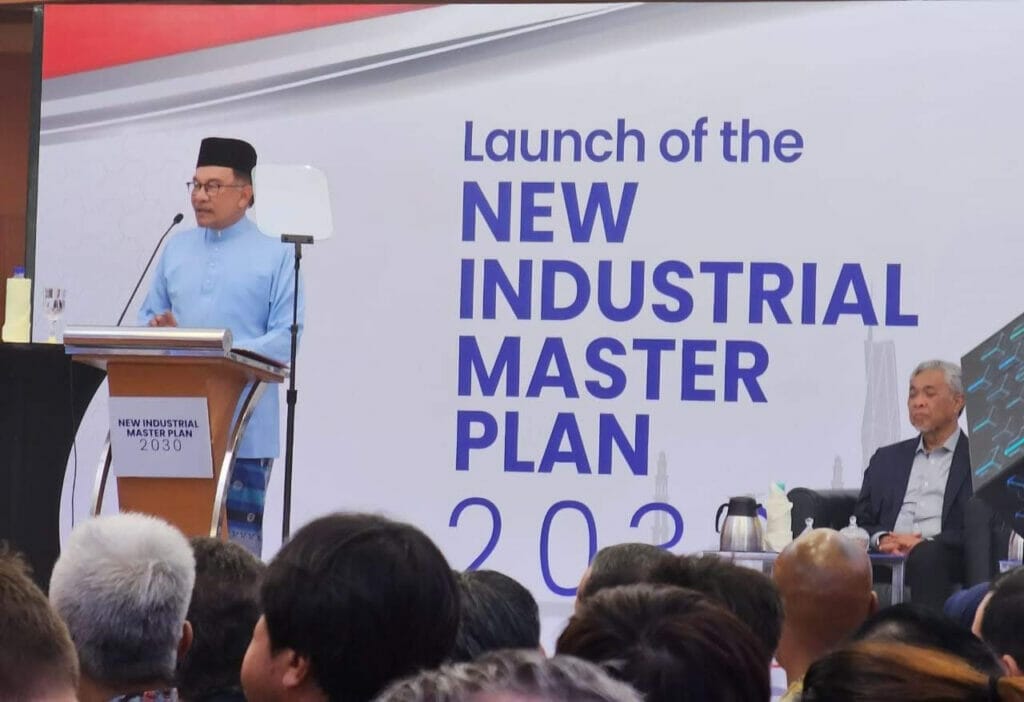The New Industrial Master Plan 2030 (NIMP 2030) is a seven-year plan by the Malaysian government to boost the manufacturing sector and create high-skilled jobs. Launched by Prime Minister Datuk Seri Anwar Ibrahim on September 1, 2023, this comprehensive policy framework outlines a strategic roadmap to transform Malaysia’s manufacturing landscape and stimulate economic growth. It requires an estimated RM95 billion in total investment and aims to increase the manufacturing’s value-added by 6.5 percent to RM587.5 billion by 2030. Additionally, NIMP 2030 incorporates specific plans to support local SMEs, enhance workforce capabilities, and improve the livelihood of Malaysians.

- SME-Centric Approach: NIMP 2030 places a spotlight on SMEs, recognizing them as a vital force in driving economic growth. With tailored initiatives and support mechanisms, the plan fosters an environment conducive to SME expansion, innovation, and market access. By nurturing the growth of SMEs, NIMP 2030 creates a ripple effect that stimulates job creation, economic diversification, and a more inclusive economy.
- Enhanced Access to Financing: Recognizing the challenges SMEs often face in securing financing, NIMP 2030 introduces subsidised financing approaches. This shift from a grant-based approach aims to provide SMEs with improved access to capital, enabling them to invest in technology, research, and development, as well as talent acquisition. Strengthening the financial foundation of SMEs empowers them to explore new growth opportunities and remain competitive on a global scale.
- Technology and Innovation Catalyst: NIMP 2030 envisions SMEs not merely as followers but as frontrunners in technological innovation. The plan emphasizes the transition from being original equipment manufacturers (OEMs) to becoming original design manufacturers (ODMs) and original brand manufacturers (OBMs). By harnessing innovation and embracing digital transformation, SMEs can develop high-value products and services, fostering a competitive edge in the international market.
- Global Value Chain Integration: Collaboration and connectivity are pivotal in today’s interconnected world. NIMP 2030 underscores the significance of deepening partnerships with neighbouring countries such as Indonesia, Thailand, and Vietnam. This integration into the global value chain enables SMEs to tap into complementary strengths, share resources, and leverage economies of scale. As a result, SMEs can expand their market reach and diversify revenue streams.
- Elevated Export Potential: The plan’s focus on advancing SMEs up the value chain opens doors to international trade opportunities. By producing higher value-added products and leveraging advanced capabilities, SMEs can position themselves as reliable partners in global supply chains. NIMP 2030’s emphasis on quality, innovation, and sustainability aligns with evolving consumer preferences, granting SMEs access to markets that prioritize environmentally conscious and socially responsible products.
Source:
- PM Anwar: New Industrial Master Plan 2030 to increase manufacturing’s value-added by 6.5% to RM587.5b (https://www.malaymail.com/news/malaysia/2023/09/01/pm-anwar-new-industrial-master-plan-2030-to-increase-manufacturings-value-added-by-65pc-to-rm5875b/88432)
- Govt rolls out seven-year New Industrial Master Plan (NIMP 2030) (https://api.nst.com.my/news/nation/2023/09/949822/govt-rolls-out-seven-year-new-industrial-master-plan-nimp-2030-create-33)
- PM Anwar: Govt fully committed to New Industrial Master Plan 2030 which requires RM95b through seven years (https://www.malaymail.com/news/malaysia/2023/09/01/pm-anwar-govt-fully-committed-to-new-industrial-master-plan-2030-which-requires-rm95b-through-seven-years/88426)
- NIMP 2030 will help grow SMEs and improve livelihoods, says PM (https://www.msn.com/en-my/news/national/nimp-2030-will-help-grow-smes-and-improve-livelihoods-says-pm/ar-AA1g4Atu)

Author Information: Henry Tye Founder & CEO of Bigdomain.my
Meet Henry Tye, the architect of Bigdomain.my’s success story. With an instinct for technological trends and a mission for digital empowerment, Henry has propelled businesses forward. As the Founder & CEO of Bigdomain.my, he offers a unique blend of strategy and tech insight, guiding businesses towards digital excellence. Henry’s dedication to securing businesses in the digital realm is an invaluable asset in today’s fast-paced landscape.





